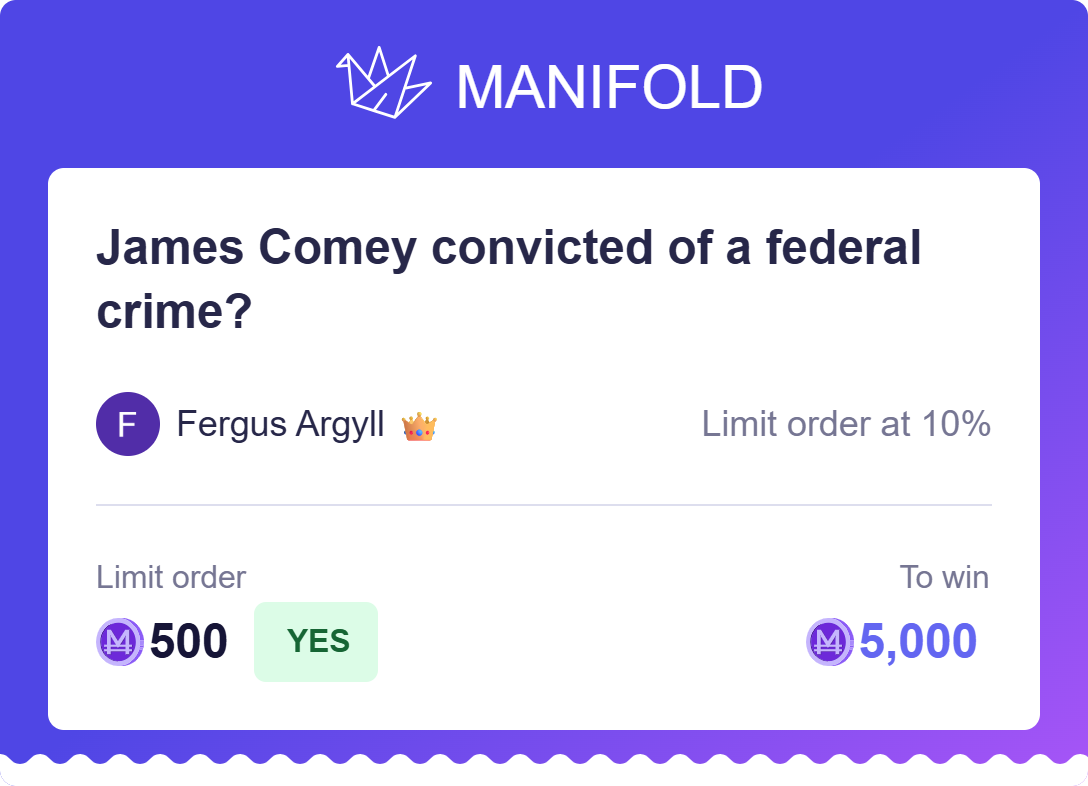Resolution criteria
Resolves YES if, before market close, a U.S. federal district court enters a signed judgment of conviction against James B. Comey (born 1960) for any federal criminal offense (felony or misdemeanor), whether by guilty plea (including nolo contendere) or by guilty verdict. Acceptable evidence: (a) the judgment on the federal docket (PACER) or a mirror via CourtListener/RECAP; or (b) a DOJ press release that explicitly states he was convicted and identifies the case. Rule 32(k) defines “judgment of conviction.” (pacer.uscourts.gov)
Resolves NO if no such federal conviction is entered by market close. Indictments, informations, complaints, arrests, congressional referrals, civil matters, and any state or local convictions do not count. If a federal conviction is entered and then vacated before market close, resolve NO; if vacated after close, the market stands. A pardon after conviction does not change a YES. A deferred prosecution/diversion without a conviction resolves NO. A nolo contendere plea counts once judgment is entered. (law.cornell.edu)
Background
Comey served as FBI Director from September 4, 2013 to May 9, 2017. (fbi.gov)
In 2019, DOJ’s Inspector General found policy violations in Comey’s handling of memos but DOJ declined prosecution. (oig.justice.gov)
As of September 24, 2025, reporting indicates EDVA prosecutors are preparing to seek an indictment of Comey for alleged false statements to Congress; no conviction exists at this time. (washingtonpost.com)
Considerations
The general federal statute of limitations for non-capital offenses is five years, which may time-box any alleged false-statements charge from 2020; an indictment before that deadline would not by itself satisfy this market’s conviction requirement. (law.cornell.edu)
Update 2025-10-27 (PST) (AI summary of creator comment): If a conviction is entered and then vacated on appeal, the market will resolve YES based on the first conviction. The creator has clarified that the first conviction counts, regardless of subsequent appellate outcomes (note: this appears to contradict the description's statement that "If a federal conviction is entered and then vacated before market close, resolve NO").
Update 2025-10-27 (PST) (AI summary of creator comment): The creator has corrected a previous statement: If a federal conviction is entered and then vacated on appeal before market close, the market will resolve NO (consistent with the original description). The market will resolve based on the current state at the resolution date, not the first conviction.
People are also trading
@BenM oh, whoops. The AI kept me honest. Appeal does not count. So this will resolve based on the current state at resolution date
And that the side that I bet has Base Rates on its side
-- Bob Dylan
